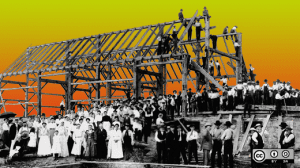 To be honest, I don’t care if you go to church or not. From my experience, going to church doesn’t necessarily make people kinder, more generous or even more Christ-like.
To be honest, I don’t care if you go to church or not. From my experience, going to church doesn’t necessarily make people kinder, more generous or even more Christ-like.
It’s like the old saying goes: going to church doesn’t make you a Christian any more than sitting in a garage makes you a car.
So why bother?
I addressed this question on my book, postChristian: What’s Left? Can We Fix It? Do We Care?. Everyone knows, Christian or not, that people are leaving organized religion by the millions. The reasons cited are many: suspicion of institutions in general; perceived hypocrisy; too busy; simply never raised within a religious culture. And on it goes.
All of this is legitimate, to varying degrees at least. But there are some things that church tends to offer us that few other things in the culture afford. And we need them, whether we know it or not. And without them, we suffer, both individually and collectively.
And no, none of them has to do with keeping you out of the fiery pits of hell. Sorry. So what do we all need – beliefs aside – that church seems fairly uniquely positioned to offer?
We Need to Bear Witness to Each Others’ Lives. We long to be known, to share our lives with one another. And in our increasingly distributed, virtualized world, our relationships grow more and more strained, abstracted. And even the connections we have online are not just superficial; sometimes they’re completely fictional. We present “selves” online that are really just avatars of our real lives. We offer the narratives people want to know, to get the response we are looking for. But we know it’s not real, so ultimately it’s not nourishing.
We want to be known – really known – and we want to know others with equal depth. Study after study shows that the greatest correlation to individual and communal well being is to the number and strength of our relationships. We may be able to live without them, but not well.
Our Joys Are Multiplied and Our Sorrows Are Made Lighter. There’s an old joke about a pastor who calls in sick on Sunday so she can go play golf instead of preach. First hole, she hits a hole in one. Then the second, third, fourth…in the end, she plays a perfect game, with eighteen holes in one. “Wow, God is blessing me today!” she thought, figuring she must be due a sabbath after all. Then she realized; she couldn’t tell anyone.
The first thing we want to do when something amazing happens is share it with people we care about. It makes it so much more meaningful when we can share it. On the other hand, grief is so much heavier when borne alone. Knowing there are others there to care for us, cry with us and identify with what we’re going through doesn’t make the hurt go away. But going through difficult times together makes the grief far easier to bear.
We Long to Mark Sacred Time. Though the word “sacred” tends to be loaded with religious implications, the root meaning of it means “set apart.” There is a lack of ritual sometimes in secular culture, and it’s something that religion does well historically. This is one reason that people who never step foot in church will still seek a sanctuary for a wedding, funeral and other special moments. We want those occasions to be special, set apart, ritualized in a way that says to us and others, “this is important.”
We Need to Hold Each Other Accountable. This isn’t as much of a want, as it is a need. I was interviewing a humanist friend a while back who was making the case that the core of Christianity really was just “be a good person.” And if that’s true, there really is no need for Christian community, except for the fact that we are notoriously self-deceiving creatures. We tend to justify whatever we’re doing as ok, even as what we do, value, own and consume changes over time. And sometimes the only solution is to have someone else hold a mirror up to us.
A real friend, and at best, a real community holds you accountable when you’re messing up. This is what Paul means when he writes about “speaking the truth in love.” Though we sometimes use this as license to point fingers at anyone and everyone, calling it the loving thing to do, it really has more to do with members of a closely knit community holding each other responsible. In as much as faith communities are about being “nice” rather than being real, my humanist friend is right. But strong community gives us life in ways that living alone can’t.
We Long for Sanctuary. Our lives are incredibly complicated. I think we can all agree that, though technology has been created with the intent to simplify our lives, our expectations of our performance always rises to meet our maximum potential for efficiency. Traffic stresses us out. Work stresses us out. Media and marketing messages stress us out. We’re bombarded with more ad impressions in a month today than any other generation has been in an entire lifetime. Whereas we used to expend energy to seek out information, now we spend that much energy – or more – holding stimulus at arms-length and filtering through what’s real and what’s bullshit.
From light pollution to noise pollution, and from the encroachment of ubiquitous mobile technology to a constant sense of immediacy about (fill in the blank), we are addicted to our own stress. We’re adrenaline junkies. But it’s exhausting. It affects our physical and emotional health. Sometimes we need a break, a rest. We want something set aside that is peaceful different, quiet, special. Someplace where all the rest of the world can’t follow us. At its best, church can offer this, and can do it incredibly well.
I get asked all the time by church leaders what it is that the world need that they can offer. These are a good start. And though our institutional missions far exceed these basic things, if we’re not living up to at least these five, the rest of the world is right; they’re better off without us.
Christian Piatt is the author of postChristian and Blood Doctrine, and is the cohost of the Homebrewed Christianity CultureCast podcast. follow him on Patheos, or connect with him on Facebook or Twitter.
















